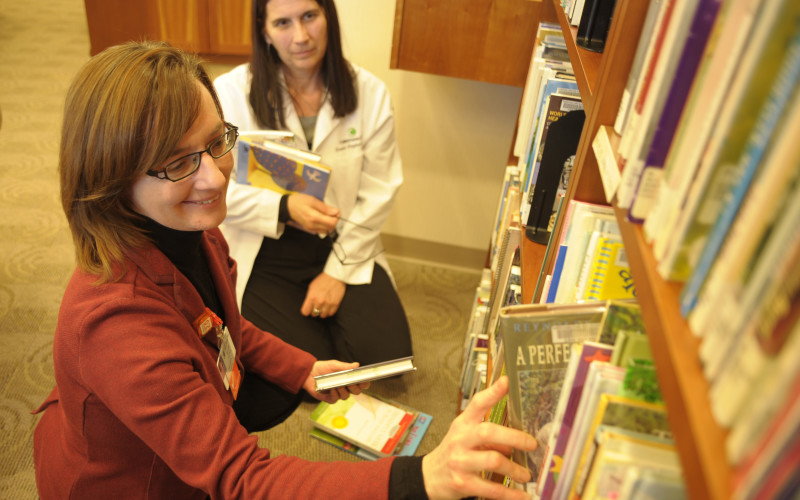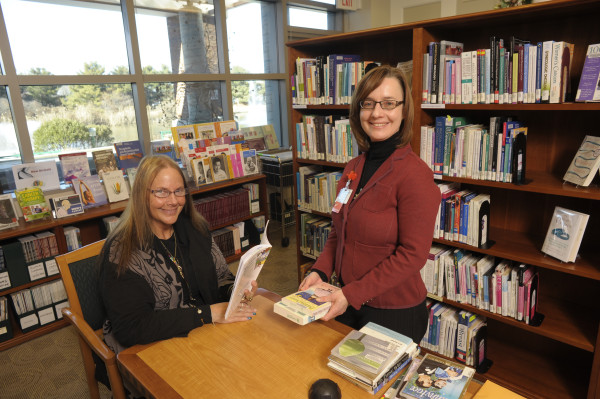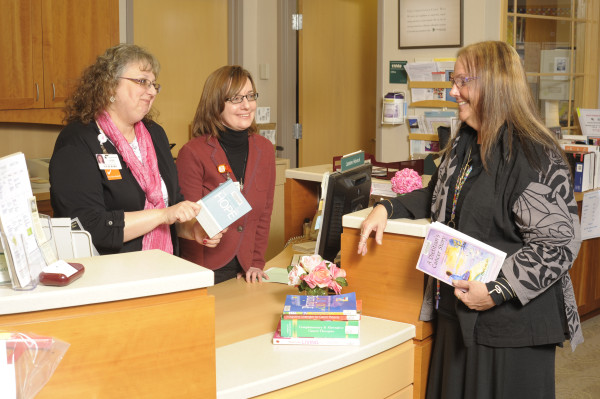Community health libraries provide information hub for patients and families

As she battled adrenal and thyroid cancer, Georgia Jones, of Wilmington, turned to yoga and meditation groups at the Helen F. Graham Cancer Center to manage her fear.
And to practice these relaxation techniques at home, Jones took out books and CDs from the Junior Board Cancer Resource Library.

Located on the first floor of the center’s east wing, the library has many resources, including computers for checking e-mail (and writing home), and DVD players for watching educational videos. There are medical newsletters, exercise and movement DVDs, children’s books and popular movies, as well as art and journaling opportunities.
The library in the Helen F. Graham Cancer Center is one of three community health libraries in the Christiana Care Health System. The others are the Health Library at Wilmington on the first floor of Wilmington Hospital (1N69) and the Gail P. Gill Community Health Library in the John H. Ammon Medical Education Center at Christiana Hospital.
Many people come to the libraries looking for easy-to-read information about a new diagnosis. The library staff can help them find current consumer health resources. They can also guide people to resources written in Spanish and other languages.
“The resources are fantastic, and those on staff are eager to help you learn what you need to know to understand your illness,” said Jones, who likes that the libraries offer a quiet space with tables and comfortable chairs. She also appreciates that after signing up for a library card, she can check out materials free for two weeks.
Community Health Librarian Ellen M. Justice, MLIS, AHIP, says the libraries had 4,125 visitors in the last fiscal year (July 2012 to June 2013). But she’s working to raise awareness about the libraries so that more people will know they are invited to browse or approach a librarian with a request.
“We know good sources to turn to for information, such as MedlinePlus (a service of the U.S. National Library of Medicine), and how to meet patients where they are,” Justice said.

The community health libraries are patient- and family-centered places where lots of hugs are given, as the libraries are sometimes a first stop when patients learn about a diagnosis, said Barbara Henry, MLS, AHIP, Christiana Care’s director of Medical Libraries.
“A family may be feeling torn apart, and it’s important to have empathy when they come in trying to understand an illness,” Henry said. “The goal is to accept people right where they are.”
The librarians also make it clear that they cannot answer every question. “Our mantra is that if you have further questions about your illness, please ask your health care provider,” she said.
In one case an intensive-care nurse referred a family member to the Gill library for a large laminated chart showing the workings of the heart. This was so the family would understand the importance of the procedure and grant consent, Henry said.
She also remembers a Virginia woman who came to Christiana Care after her brother was in an almost-fatal car accident. During the weeks of his recovery, the woman telecommuted to work each day on a library computer.
“She needed the resources of the library because she did not have a laptop,” said Henry.
Oncology dietitian Elena Schumacher, RD, often refers patients to the libraries, especially if cancer treatments create special needs because of radiation or chemotherapy. For instance, a patient with trouble swallowing can benefit from a book such as the “Easy-to-Swallow, Easy-to-Chew Cookbook” by Paula Sullivan, one of many cookbooks in the library collection.
Senior Social Worker Carmela Longobardi, MSW, suggests that families visit the libraries for a break in their daily efforts to help a loved one battling a serious illness. She says the libraries are a haven where people can decompress and pick up materials on everything from meditation to coping with grief.
“When my mother was diagnosed with lung cancer, I used the library to guide me into an appropriate participation in her illness,” said Longobardi.
Several areas of the libraries are popular including the DVDs, nutrition, exercise and relaxation collections.
“We have an extensive audio-visual collection that includes classical and relaxing music, guided visualizations and meditations, anatomical models, and a very popular collection of hundreds of movies that include comedies, romance, dramas and documentaries,” Justice said.
The busiest library is at the cancer center, as patients in treatment are in and out of the building often and learn to appreciate the library’s specialized resources.
Questions brought to the Gill library cover a spectrum of issues — everything from weight loss to diabetes, asthma to baby care.
Use of the Gill library is growing, and Justice hopes to see a similar growth in use of the Wilmington library as construction in the building draws to a close. Awareness of the Gill library has grown thanks to a program called Health Information To Go. Every two weeks a librarian sits outside the hospital cafeteria with a computer and printer, looking up information for whoever has a question.
In addition, Justice and her staff have shared information about the libraries at health fairs and with Delaware support groups. The library staff also stocks library carts with pamphlets and information sheets, called “Pathfinders.” These are topical resource lists that give a snapshot of books, DVDs, CDs and websites for learning about a health issue, such as heart disease, meditation or parenting. Justice also contributes to the Christiana Care Wellness blog.
Justice said last year there were 5,479 items checked out of the libraries and 152 health care packets supplied. Many of the health care packets were mailed to people who called in. Some people do not have computers, and for them the library can be a lifeline of vital information.
To reach the Gail P. Gill Community Health Library or one of the other community health libraries, call 302-733-1122.